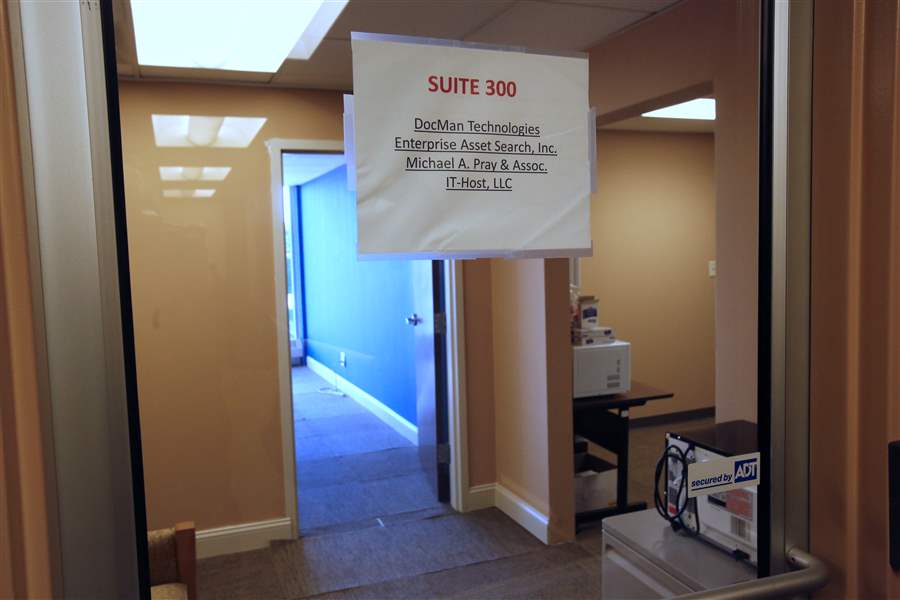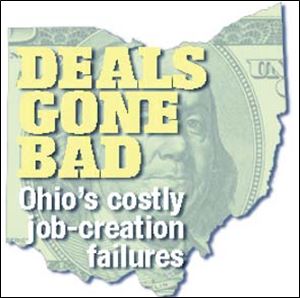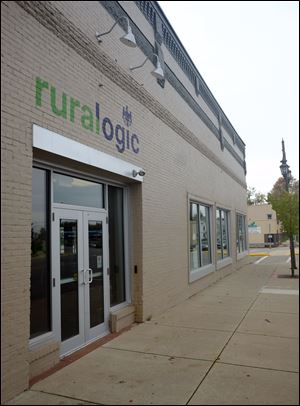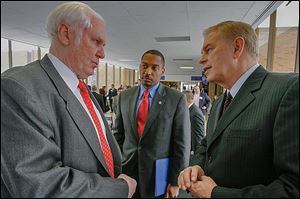
A BLADE INVESTIGATION
Political ties aid firms seeking state assistance
Oftentimes, Ohio taxpayers’ money goes to waste
10/28/2013
The Beachwood, Ohio, offices of Attevo Inc., an information technology firm that received a $1.1 million state loan, are occupied by another company. A man who recently answered the door there said he was unfamiliar with Attevo.
The Blade/Katie Rausch
Buy This Image

‘We don’t want to be in a situation where we overregulate where we grind to a halt,’ said David Goodman, director of the Development Services Agency. ‘We want to be nimble, we want to be able to be reasonable and act appropriately, and we want to make sure we are protecting the state investment.’
Second of three parts

When C. David Snyder wanted access to powerful members of former Ohio Gov. Ted Strickland’s administration, the Cleveland businessman got it.
There was an open line of communication between Mr. Snyder or his employees and top Democrats such as Lt. Gov. Lee Fisher, Office of Budget and Management Director Pari Sabety, and even Mr. Strickland.
Mr. Snyder’s close relationship with the Strickland administration — detailed in hundreds of state records that include emails, calendar entries, and financial documents — helped two of his businesses net $3.2 million in state incentives in 2009 and 2010 as Mr. Strickland campaigned for re-election.
The loan, grants, and tax credits Mr. Snyder’s companies received are an example of how business people use relationships with politicians to grow their companies. State financing is particularly attractive because it carries a lower interest rate than a bank loan. Even better, state officials sometimes dole out grants that don’t have to be paid back.
PHOTO GALLERY: Political ties aid firms seeking state assistance
DATABASES: LOANS and GRANTS awarded from 2007-2012, jobs promised, and actual number of jobs created
DAY 1 ARTICLES:
Politicians also benefit from these deals by taking credit for the jobs companies say they create. Many elections have been won by candidates who can convince voters they created the most jobs.
These relationships, however, don’t always work: In many instances, companies don’t add employees and the taxpayers’ money is wasted. That’s the case with Mr. Snyder and his businesses, which are in financial turmoil.
A Blade investigation into the state’s use of taxpayer funding to create jobs discovered that half the companies that received grants from 2007 to 2012 failed to generate the jobs they promised. The businesses were awarded $45.5 million in grants, which is about half the grant money paid to companies with job-creation requirements.
The investigation also found that 25 percent of the businesses that received loans have not kept up with repayments, need more time to complete projects, or have shut their doors.
There also are allegations that some companies committed fraud and misused state development funds.
Most of the time, the state is unaware of problems at the firms. And when it is aware of issues, the woes often are masked behind piles of paperwork at the Ohio Development Services Agency, formerly the Ohio Department of Development.
Based on a review of 139 loan modification requests made by companies that received state assistance, 137 of those requests were approved. The remaining two requests were so heavily redacted, it was impossible to determine the course of action recommended by state officials.
The state, it seems, is in the business of saying yes.
“We don’t want to be in a situation where we overregulate where we grind to a halt,” said David Goodman, director of the Development Services Agency under Republican Gov. John Kasich. “We want to be nimble, we want to be able to be reasonable and act appropriately, and we want to make sure we are protecting the state investment.
“There is a balance.”

Funding request
The first state incentive Mr. Snyder received was directly tied to a funding request from Governor Strickland’s office, said Eileen Granata, a regional economic development administrator under the Strickland administration. Mr. Snyder’s Cleveland information technology company, Attevo Inc., received a $1.1 million loan.
Mr. Snyder is part owner, president, and chief executive officer of the company.
Ms. Granata, who now works as a senior attorney for the city of Toledo, said it was not uncommon for the governor’s office to make requests, and she did not feel pressured to fund Attevo.
“We had some saying, ‘Can you see if we can get this moving?’ They wanted to see it,” she said. “I had conversations with the governor’s chief of staff, John Haseley, who said, ‘Eileen, how’s this going?’ and I said, ‘John, they have to get a plan first,’ and John was, ‘OK, I understand.’”
Another of Mr. Snyder’s businesses, Ruralogic Inc., received tax credits and grants totaling $2.27 million from the Strickland administration, none of which has to be repaid. The firm also was awarded two grants totaling $100,000 under Governor Kasich.
A spokesman for Mr. Strickland said the former governor was unavailable for an interview and released this statement from him: “As governor, I strategically used state resources to attract or retain good jobs. I also demanded that this process be transparent to help policy makers and voters gauge whether these incentives were worth the cost.”
Mr. Kasich did not comment.
State documents show Attevo promised it would add 35 jobs to its payroll; Ruralogic was obliged to create 121 positions. Those jobs never materialized.
The Blade stopped by the Beachwood, Ohio, office complex that Attevo lists as its address and found the company wasn’t there. The firm, which changed its name to CIRRIC in 2012, states on its Web site that the Beachwood building is its headquarters.
A man who answered the door at the two-office suite said he’d been there for about a year and was unfamiliar with Attevo.
When The Blade went to Napoleon, Ohio, to visit Ruralogic’s office, it found the building was vacant. No furniture or office equipment was seen through the building’s plate-glass windows.
According to a lawsuit filed by the building’s landlord in Henry County Common Pleas Court, Ruralogic began to miss rent payments in October, 2012. The missed rent payments occurred four months after Ruralogic submitted paperwork to the state for a $25,000 grant and just five months after the company signed its lease. The court record doesn’t state when Ruralogic vacated the building.
The state, which approved Ruralogic for the $25,000 grant, has not disbursed the funding for it.

The Beachwood, Ohio, offices of Attevo Inc., an information technology firm that received a $1.1 million state loan, are occupied by another company. A man who recently answered the door there said he was unfamiliar with Attevo.
Questions arise
When Attevo received its $1.1 million loan from the state, the company was conducting most of its development overseas, said John Frankovich, the firm’s former chief operating officer. Whether the loan funds were properly used is questionable, he said.
“There was a lot of development done, and it was done with people who were working with Attevo in Europe at the time,” he said. “It was actively being spent on that product. I thought there were pretty stringent requirements on what had to be done so the money was paid out.”
According to documents Attevo provided to state development officials, $1.38 million of the $1.76 million project was paid to Attevo employees. Mr. Snyder, another company executive, and an employee stationed in the United Kingdom were among the people paid.
It’s unclear how much each person received because the documents were heavily redacted.
Mr. Snyder always was pressing for cash, said Gary Dowdy, a former partner at Attevo. Mr. Dowdy said his paychecks were routinely late.
A lawsuit filed by Mr. Dowdy and three other former Attevo employees states that paychecks would bounce because of “insufficient funds,” payroll deductions slated for employee insurance and retirement accounts were not deposited, and company funds might have been routed through the personal bank accounts of executives.
“He’s the Bernie Madoff of Cleveland,” Mr. Dowdy said.
Mr. Dowdy said he was fired from Attevo after he asked about illegal financial transactions occurring at the company. His lawsuit states that he was fired “immediately following” a meeting in 2011 in which he asked about the firm’s “failure[s] to comply with financial responsibilities, employer obligations, business reporting requirements, and corporate legalities.”
U.S. Department of Labor spokesman Scott Allen would not comment to The Blade because an investigation of Attevo is ongoing.
Mr. Snyder would not comment for this article.
On Sept. 26, The Blade went to his gated home in Lakewood, Ohio, a suburb of Cleveland, and spoke with his wife, Michelle Snyder, who declined to comment. A Blade reporter left his business card with Mrs. Snyder. A call placed to Mr. Snyder was not returned.
Attevo has missed $343,705 in state loan repayments and is more than a year delinquent as of Oct. 15. The firm owes more than $1 million to the Development Services Agency, which has taken no legal action against Attevo.

Ruralogic Inc. received tax credits and grants totaling $2.27 million from the Strickland administration, none of which has to be repaid. The firm also was awarded two grants totaling $100,000 under Governor Kasich. When The Blade went to Napoleon, Ohio, to visit Ruralogic’s office, it found the building vacant.
Money troubles
Mr. Snyder’s money troubles began about six years before his companies received taxpayer funding and continued well after that. Lawsuits and liens that name Attevo also were found by a Blade search before and during the period when the state was awarding a loan, grants, and tax credits to Mr. Snyder’s firms.
A search of municipal, county, state, and federal court records from 2003 to 2008 revealed lawsuits and liens against Mr. Snyder in the amount of $351,403. Mr. Snyder owed money to a landscaper, Cleveland’s ABC Bail Bonds, and a firm for which he provided a personal financial guarantee, court documents state.
Mr. Snyder signed a $165,000 personal guarantee as part of Attevo’s $1.1 million state loan. It represents 15 percent of the loan.
When court records were searched for Attevo, The Blade discovered liens and lawsuits totaling $339,835 from 2008 through 2012. It also found that while the state was still awarding incentives to Mr. Snyder’s businesses, Attevo owed $2.9 million to Ohio agencies and the Internal Revenue Service.
The firm also owed $7,706 to the state of California, $5,253 to Pennsylvania, and $3,665 to Illinois, records state.
Attevo stopped paying its taxes in the United Kingdom in 2008 and was disbanded by an order from the Chancery Division of the High Court of Justice in February, 2011. In total, Attevo owed Her Majesty’s Revenue and Customs £228,664, which is about $365,634.
Mr. Snyder’s legal troubles, as well as those of Attevo and Ruralogic, continue to mount.

C. David Snyder's home in the Cleveland suburb of Lakewood overlooks Lake Erie. Mr. Snyder’s close relationship with former Gov. Ted Strickland’s administration helped two of his businesses net $3.2 million in state incentives in 2009 and 2010 as Mr. Strickland campaigned for re-election.
State oversight?
It is unclear if state officials were aware of the financial woes facing Attevo and Mr. Snyder because the Development Services Agency’s files on Attevo were heavily redacted.
Lyn Tolan, deputy director of policy and communications for the Development Services Agency, said the state “was aware of some litigation and claims. In addition, as part of the disbursement process, the company certified that all original representations were true and accurate and there was no default.” Ms. Tolan would not go into detail about what information the state knew because she said it is proprietary.
Ms. Tolan said the state did check with the Ohio Department of Taxation before it loaned money to Attevo.
The litigation and claims against Attevo and Mr. Snyder aren’t included in the state loan agreement. A review of state records shows Ohio’s loan contracts typically include that information. It also isn’t mentioned in the report from the Ohio’s Controlling Board, which voted in favor of granting a loan to Attevo.
The Blade’s investigation of the state found it missed financially damning information during the vetting process before awarding state incentives to other firms. Although the state has revamped how it awards and monitors loans, grants, and tax credits, some of that work now is performed behind closed doors by JobsOhio, a nonprofit organization that is shielded by state law from public scrutiny. The agency has been criticized for not being transparent and having conflicts of interest.
Financial issues relating to Mr. Snyder or his companies aren’t mentioned in emails The Blade received as part of a public records request of Mr. Strickland’s office, the Office of Budget and Management, and the Ohio Department of Administrative Services.
Attevo’s financial issues also are not mentioned in the firm’s own financial reports, which were obtained by The Blade. The reports, which were dated 2008, 2010, and 2011 and marked as confidential, show the company was in good financial health.
“We used to go to management meetings we had maybe once a quarter and we would get a copy of the income statements by group and they always showed that we were doing pretty well,” Mr. Frankovich said.
Even after many of Attevo’s money troubles were readily available in public records, the development officials working under Governor Kasich granted the company two loan modifications in 2012. The modifications allowed the business to change the terms of its payment plan and defer payments.
The documents do not mention any financial issues facing Attevo and state the company was making financial progress.
“You’ve got to do your homework and you’ve got to be skeptical because this is not the expertise of government,” said Stephen Buser, a professor emeritus of finance at the Ohio State University.

Michael J. Cicak, CEO of Willard & Kelsey Solar Group LLC, speaks with Gov. Ted Strickland in February, 2010, at the University of Toledo, as State Treasurer Kevin Boyce looks on. Campaign donations affiliated with Perrysburg-based Willard & Kelsey, which defaulted on $10 million in state loans, totaled $25,400 to Mr. Strickland. Mr. Cicak, whose solar firm has since gone out of business, contributed $10,000.
Ties to Strickland
The Strickland administration relied on the advice of Mr. Snyder, who made a name for himself by founding and eventually selling a software development firm in 1998 for an undisclosed sum.
Mr. Strickland’s staff included Mr. Snyder in discussions about who to place on state boards and commissions, records show.
An email about the Ohio Venture Capital Authority dated Feb. 28, 2007, from a Strickland staffer states: “Mr. Snyder — It was nice speaking with you. I know John [Haseley] and the rest of us certainly appreciate your willingness to offer some guidance on this.”
Mr. Snyder and his businesses also were the subject of several communications sent among staffers. A January, 2007, interoffice email that mentions Mr. Snyder — sent to Mr. Strickland’s chief of staff four days after the governor took office — contains no text and simply said “Dave Snyder is at the Statehouse” in the subject line.
The records also indicate that Mr. Snyder was a candidate for the Ohio Third Frontier Commission, a $2.3 billion venture that helps award state incentives to technology firms.
Mr. Snyder and his wife were top donors to the Strickland campaign during the 2006 election, giving a total of $21,000. The couple also threw a small campaign fund-raiser at their Lakewood mansion during Mr. Strickland’s re-election bid, which was attended by some of Attevo’s employees.
The Blade interviewed seven former Attevo employees, including Mr. Dowdy and Mr. Frankovich. The employees said Mr. Snyder and Mr. Strickland had a friendly relationship, and the governor dropped by their office a few times during his tenure. One visit was touted in an email blast from Attevo in October, 2009.
Mr. Snyder — who was appointed as an Ohio University trustee by former Republican Gov. Bob Taft — was in with all the right people, Mr. Dowdy said.
“He got in to see Ted pretty easily because they are friends, and when he had something to say, he got access,” he said.
Changing teams
The access also paved the way for jobs at Ruralogic for two top officials in the Strickland administration.
Rex Plouck, a former deputy director at the Ohio Department of Administrative Services, and Aaron Erickson, a former deputy director of the Office of Budget and Management, both went to work at Ruralogic before Governor Strickland left office.
Both men had contact with Mr. Snyder and his business associates while they were state employees, state records show. In fact, both provided Mr. Snyder or his employees with information about how they could acquire new business. “I believe I met with [David Snyder] once, and he came in and described what Attevo did,” Mr. Plouck told The Blade. “I really just met him through the process of him reaching out to me in my previous capacity. That was really kind of our connection.”
Mr. Plouck, who served as the president of Ruralogic from January, 2010, to February, 2011, said he helped bring Mr. Erickson on while he was running Ruralogic.
A January, 2010, email from Mr. Erickson — who was still a state employee — to Mr. Plouck states: “I want to get your opinion on what I am doing next and was planning to talk to Dave ... this Friday or next Friday works for me.”
Mr. Erickson, who became a director at Ruralogic, declined to comment.
Failed projects
The state is rife with connections between politicians and business people. Sometimes, these connections involve campaign donations. Other times, businesses allow politicians to stump at their factories.
Campaign donations affiliated with Perrysburg-based Willard & Kelsey Solar Group, which defaulted on $10 million in state loans, totaled $25,400 to Mr. Strickland. The firm also was toured by big-name Democrats such as Mr. Strickland, Vice President Joe Biden, and former U.S. Labor Secretary Hilda Solis.
Ohio Attorney General Mike DeWine is suing Willard & Kelsey and accused the firm of fraud in court documents.
WebCore Technologies, which Mr. Strickland toured in April, 2010, closed in 2012. Daniel Hutcheson, head of the wind-turbine materials manufacturer, made campaign donations to Mr. Strickland and to Mr. Fisher, who was the head of the former Department of Development while he was lieutenant governor.
Mr. Hutcheson said he didn’t curry political favor by making campaign donations, and the firm failed because it had a dramatic reduction in its cash flow.
“I met with Gov. Bob Taft, also,” he said. “We worked with both sides, whoever was representing the state.”
The state wrote off $689,000 of WebCore’s $989,000 loan after the Miamisburg firm agreed to pay a $300,000 settlement.
On his Web site, Mr. Strickland still touts Willard & Kelsey and the now-shuttered InSet Systems as successes of the state’s 2008 Bipartisan Jobs Stimulus Plan. InSet, a mining-safety company that was toured by Mr. Strickland, closed in April.
The Akron company received the OK from state officials to defer repayment of its $792,750 state loan under Governor Kasich’s administration in February, 2011. The loan has been referred to the attorney general for collection.
“We just weren’t able to solve the technical problems before our competition moved on and the market moved on,” said Jay Breeding, who was the chief operating officer of InSet. “We wouldn’t have gotten as far as we did without the help from the state. Unfortunately, that wasn’t all the way to the finish line.”
Although the Kasich administration frequently plugs the governor’s job-creation efforts, conflicts of interest are harder to see under this administration than the Strickland years. JobsOhio, which works with the Development Services Agency to award taxpayer funding, is responsible for handling its own conflicts of interest.
JobsOhio was named in a report released by the Ohio Ethics Commission in September as having potential conflicts of interest. The commission identified 13 instances where conflicts could exist.
The files of JobsOhio — even those that relate to taxpayer-funded projects — are not public, making it harder to examine relationships between state officials and businesses.
The Development Services Agency also has cracked down on how much information it shares with the public. It heavily redacted files The Blade received as part of a public records request this year. Some of the same files were included in a 2012 request and contained few redactions.
“People try to connect dots all the time. I have a zero tolerance policy for us making any decisions that are other than what is in the best interest of the people of the state of Ohio,” said Mr. Goodman, director of the Development Services Agency.
Contact Kris Turner at: kturner@theblade.com or 419-724-6103.